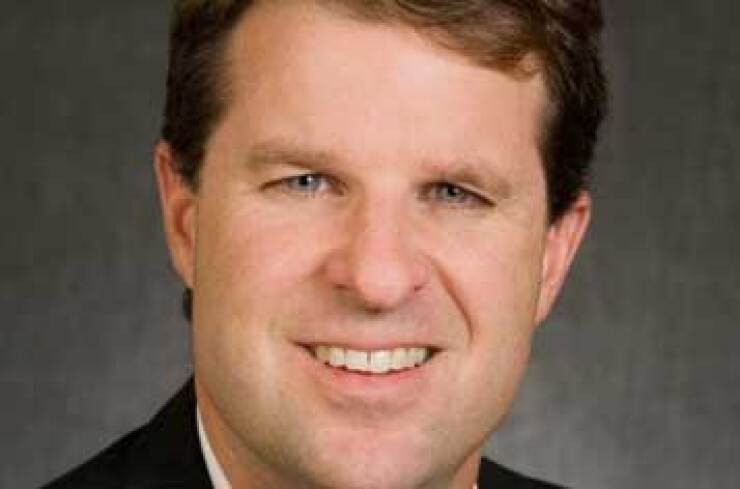
Puerto Rico's 2013 efforts to strengthen its pension plans faltered in 2014.
The government contributed $98.6 million less to its main pension plan in fiscal year 2014 than its April 2013 pension reform called for, according to its
The contribution plan set up in the pension overhaul was part of Puerto Rico's fiscal 2014 budget, but Gov. Alejandro García Padilla made the cut at the end of the fiscal year in response to a surprisingly weak April revenue collection. The commonwealth was also impacted this year by an adverse court decision affecting its Teachers Retirement System.
In the current fiscal year, the government anticipates contributing $95 million less to the Employees Retirement System than originally called for in its pension overhaul package.
The plan called for the government to make special $120 million additional contributions to its pension in each of the two fiscal years.
"Failure by the commonwealth and other participating employers to make up for the shortfall in the additional contribution for fiscal years 2014 and 2015, as well as to make future additional contributions at the level determined by the actuaries in accordance with [the pension reform act] on a timely basis, will have a material adverse effect on the future solvency of the Employees Retirement System," the commonwealth stated in the quarterly report.
Even before the recent funding shortfalls, the Employees Retirement System's funded ratio declined to 3.1% on June 30, 2013 from 4.5% on June 30, 2012, according to the report. The funded ratio is defined as the actuarial value of assets divided by the actuarial accrued liability.
On June 30, 2013 the fund's unfunded actuarial accrued liability was $22.9 billion, according to the commonwealth's quarterly report. More recent data is not available.
The commonwealth's Teachers Retirement System had a 15.6% funded ratio and $10.3 billion unfunded actuarial accrued liability. The Judiciary Retirement System had a 14.2% funded ratio and a $358 million unfunded actuarial accrued liability.
The three pension systems had a total $33.7 billion UAAL.
"We see pensions as one of numerous fiscal pressures on the commonwealth, and the pullback in the contributions in fiscals 2014 and 2015 is illustrative of the strained fiscal position," said Fitch Ratings managing director Laura Porter.
Standard & Poor's senior director David Hitchcock said the contribution shortfall is "going to increase out-year required contributions."
This is one of S&P's concerns about Puerto Rico.
AllianceBernstein director of municipal research Joseph Rosenblum said the contribution shortfall "shows that effectively they really have not put together a structurally balanced budget."
Carlos Ramos Domenech, spokesman for the commonwealth's Employees and Judiciary Retirement Systems Administration, pointed out the special contribution was just a part of the government's total contribution in the last and current fiscal year. In fiscal 2014 the government and its sister government bodies contributed $843.4 million, he said, including $21.3 million for the special contribution.
These same sources expect to contribute a total of $896.5 million in the current fiscal year, he said.
These contributions are in addition to employee contributions. In the main pension plan, employees contribute 10% of their income to the pension plan, Ramos Domenech said.
Besides mandating the special contributions, the pension reform had other provisions to improve the systems' financial health. Retirees were converted to annuities from lump-sum payments, the Christmas bonus was cut, as was sick pay, Ramos Domenech said. Additionally, the retirement age has been increased for most employees. Depending on when they started work, some have seen the age shift to 61 from 58 and some to 65 from 60. Those who started work after April 2013 have a retirement age of 67.
"All of the laws that have been put in place recently are geared to providing the system with higher revenues and lower outflows," Ramos Domenech said. "Additionally, the legal framework has strengthened the ability of the system to collect past due contributions," he said.
In late June 2014 the governor ordered legislation be prepared to pay fiscal year 2014's unpaid fiscal special pension contribution, Ramos Domenech said.
"Puerto Rico's pension system faced near-term insolvency when [García Padilla] took office [at the start of 2013]," Municipal Market Advisors managing director Robert Donahue said. "This resulted from many years of underfunding, poor oversight and neglect. The governor's courage and willingness to tackle pension reform was a long-overdue step forward."
Asked about the reforms of the main pension system outside the special contribution, Donahue said, "While the reforms are positive in avoiding pay-as-you-go pension funding which would drain general fund resources, it is important for investors to recognize that, despite the reforms, both [the main and the Teachers] pension systems in Puerto Rico remain dramatically underfunded. Investors in the United States penalize states like Illinois which has a funded ratio below 50%, while the commonwealth's is far worse at below 10%, and there is little hope this ratio will improve."
Concerning Puerto Rico's plans to not make $95 million in scheduled additional contributions to the main pension plan, Donahue said, "Given the commonwealth's government's uncertain liquidity without the tax and revenue anticipation note proceeds secured yet, it seems logical to postpone this payment (as well as others to suppliers) until the TRANs money comes in. Given the likelihood the government will face liquidity pressures during the current fiscal year, it remains to be seen whether this payment will ever be made."
Moody's Investors Service senior analyst Edward Hampton said that Puerto Rico's failure to fulfill its promised pension funding levels was a small problem compared to the commonwealth's other problems.
While the commonwealth's efforts to strengthen its main pension system has been weakened by its own failure to make the scheduled contributions, its efforts to improve the Teachers Pension System has been undercut by court action.
Puerto Rico's government adopted the system overhaul in December 2013. In April, the Puerto Rico Supreme Court struck down the reform.
In the weeks that followed, a source close to the governor said that his team was looking at either appealing the decision or introducing alternate legislation to reform the system.
Since then the García Padilla administration has been largely quiet on the topic.
"The commonwealth has stated in the past that without reform the teachers retirement system would confront an annual cash flow deficit beginning in fiscal 2020, so that is clearly a concern," Fitch's Porter said.
"Now that investment grade ratings have been lost and that the election cycle is approaching, it is possible that unions will pressure the governor to soften and/or slow further reforms," Donahue said when asked about the future of the teachers pension system.
The next elections for Puerto Rico's governorship, Senate, and House of Representatives are in November 2016.
"After tackling the $2.2 billion budget deficit in the first 18 months of the administration and approving the first balanced budget in nearly two decades, the governor - and his fiscal team - turned their attention at the start of the new fiscal year to Puerto Rico's public corporations and their self-sufficiency in order to safeguard the general fund," the governor's press office said in a statement responding to The Bond Buyer's request for comment about the teachers' pension system. "In the coming months the governor will be presenting an important overhaul to the Puerto Rico tax code that will enhance his economic development agenda. Nevertheless, the administration remains aware of pending fiscal issues, such as the Teachers Retirement System pension reform, and does not rule out further legislation in the current or the January session."





